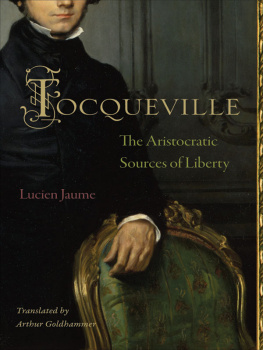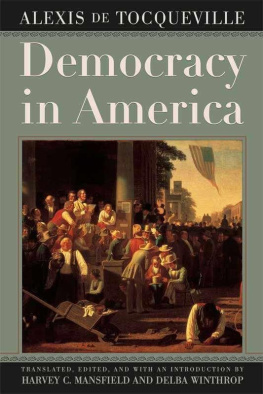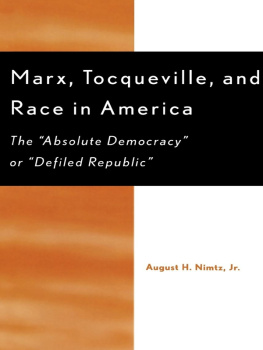The Americans live in a democratic state of society, which has naturally suggested to them certain laws and a certain political character. This same state of society has, moreover, engendered amongst them a multitude of feelings and opinions which were unknown amongst the elder aristocratic communities of Europe: it has destroyed or modified all the relations which before existed, and established others of a novel kind. Theaspect of civil society has been no less affected by these changes than that of the political world. The former subject has been treated of in the work on the democracy of America, which I published five years ago; to examine the latter is the object of the present book; but these two parts complete each other, and form one and the same work.
I must at once warn the reader against an error which would be extremely prejudicial to me. When he finds that I attribute so many different consequences to the principle of equality, he may thence infer that I consider that principle to be the sole cause of all that takes place in the present age: but this would be to impute to me a very narrow view. A multitude of opinions, feelings, and propensities are now in existence, which owe their origin to circumstances unconnected with or even contrary to the principle of equality. Thus if I were to select the United States as an example, I could easily prove that the nature of the country, the origin of its inhabitants, the religion of its founders, their acquired knowledge, and their former habits, have exercised, and still exercise, independently of democracy, a vast influence upon the thoughts and feelings of that people. Different causes, but no less distinct from the circumstance of the equality of conditions, might be traced in Europe, and would explain a great portion of the occurrences taking place amongst us.
I acknowledge the existence of all these different causes, and their power, but my subject does not lead me to treat of them. I have not undertaken to unfold the reason of all our inclinations and all our notions: my only object is to show in what respects the principle of equality has modified both the former and the latter.
Some readers may perhaps be astonished thatfirmly persuaded as I am that the democratic revolution which we are witnessing is an irresistible fact against which it would be neither desirable nor wise to struggleI should often have had occasion in this book to address language of such severity to those democratic communities which this revolution has brought into being. My answer is simply, that it is because I am not an adversary of democracy, that I have sought to speak of democracy in all sincerity.
Men will not accept truth at the hands of their enemies, and truth is seldom offered to them by their friends: for this reason I have spoken it. I was persuaded that many would take upon themselves to announce the new blessings which the principle of equality promises to mankind, but that few would dare to point out from afar the dangers with which it threatens them. To those perils therefore I have turned my chief attention, and believing that I had discovered them clearly, I have not had the cowardice to leave them untold.
I trust that my readers will find in this second part that impartiality which seems to have been remarked in the former work. Placed as I am in the midst of the conflicting opinions between which we are divided, I have endeavored to suppress within me for a time the favorable sympathies or the adverse emotions with which each of them inspires me. If those who read this book can find a single sentence intended to flatter any of the great parties which have agitated my country, or any of those petty factions which now harass and weaken it, let such readers raise their voices to accuse me.
The subject I have sought to embrace is immense, for it includes the greater part of the feelings and opinions to which the new state of society has given birth. Such a subject is doubtless above my strength, and in treating it I have not succeeded in satisfying myself. But, if I have not been able to reach the goal which I had in view, my readers will at least do me the justice to acknowledge that I have conceived and followed up my undertaking in a spirit not unworthy of success.
A. De T.
March 1840
Philosophical Method of the Americans
I think that in no country in the civilized world is less attention paid to philosophy than in the United States. The Americans have no philosophical school of their own; and they care but little for all the schools into which Europe is divided, the very names of which are scarcely known to them. Nevertheless it is easy to perceive that almost all the inhabitants of the United States conduct their understanding in the same manner, and govern it by the same rules; that is to say, that without ever having taken the trouble to define the rules of a philosophical method, they are in possession of one, common to the whole people. To evade the bondage of system and habit, of family maxims, class opinions, and, in some degree, of national prejudices; to accept tradition only as a means of information, and existing facts only as a lesson used in doing otherwise, and doing better; to seek the reason of things for ones self, and in ones self alone; to tend to results without being bound to means, and to aim at the substance through the form;such are the principal characteristics of what I shall call the philosophical method of the Americans. But if I go further, and if I seek amongst these characteristics that which predominates over and includes almost all the rest, I discover that in most of the operations of the mind, each American appeals to the individual exercise of his own understanding alone. America is therefore one of the countries in the world where philosophy is least studied, and where the precepts of Descartes are best applied. Nor is this surprising. The Americans do not read the works of Descartes, because their social condition deters them from speculative studies; but they follow his maxims because this very social condition naturally disposes their understanding to adopt them. In the midst of the continual movement which agitates a democratic community, the tie which unites one generation to another is relaxed or broken; every man readily loses the trace of the ideas of his forefathers or takes no care about them. Nor can men living in this state of society derive their belief from the opinions of the class to which they belong, for, so to speak, there are no longer any classes, or those which still exist are composed of such mobile elements, that their body can never exercise a real control over its members. As to the influence which the intelligence of one man has on that of another, it must necessarily be very limited in a country where the citizens, placed on the footing of a general similitude, are all closely seen by each other; and where, as no signs of incontestable greatness or superiority are perceived in any one of them, they are constantly brought back to their own reason as the most obvious and proximate source of truth. It is not only confidence in this or that man which is then destroyed, but the taste for trusting the ipse dixit of any man whatsoever. Everyone shuts himself up in his own breast, and affects from that point to judge the world.













